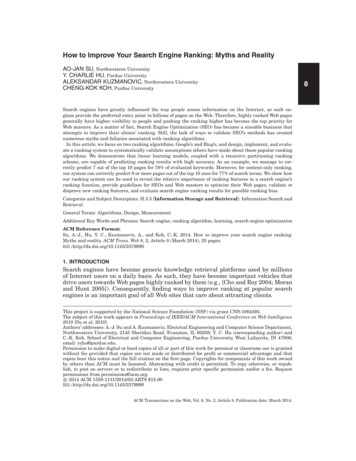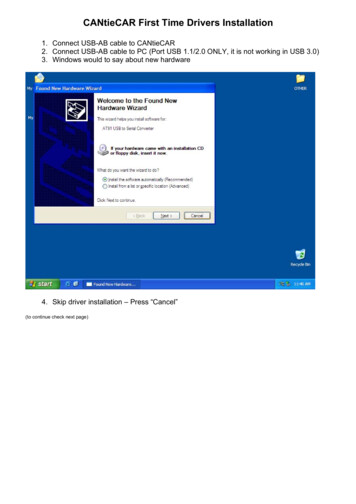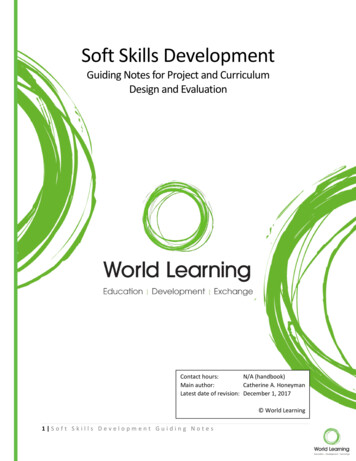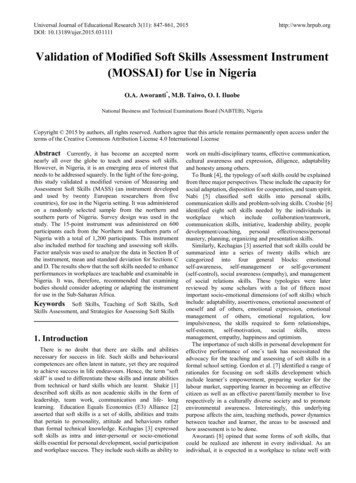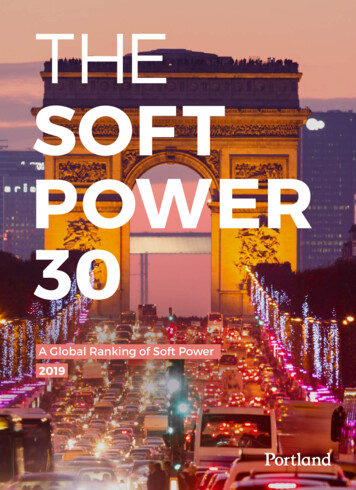
Transcription
A Global Ranking of Soft Power2019
Designed by Portland's in-house Content & Brand team.
CONTENTS626Creator and AuthorMethodology of the indexObjective data7Subjective dataContributorsChanges, limitations, and shortcomings1036Executive SummaryResults and analysisThe top five14IntroductionAmerican soft power after TrumpJoseph S. Nye, Jr., Harvard UniversityThe remaining top tenWhat’s past is prologueSmall is beautifulThe 2019 Soft Power 30Is soft power enough? A realist’s perspectivefrom the “Little Red Dot"Bilahari Kausikan, National University of SingaporeBreaking down the objective dataBreaking down the resultsThe soft power of government innovationAdrian Brown, Centre for Public ImpactThe Asia Soft Power 10Making (limited) inroadsJames Crabtree, Lee Kuan Yew School of PublicPolicy
74110Soft power in a digital first worldConclusion and look aheadPublic diplomacy and our digital futureJay Wang, USC Center on Public DiplomacyTrends and findings from 2019Everybody at the table: Transnational digitalcooperationFadi Chehadé, USC Center on Public DiplomacyLooking ahead118With a little help from my friends: Reviving SriLankan tourismPortland case studyAppendixShort circuit: What will artificial intelligencemean for diplomacy?Kyle Matthews, Concordia UniversityAppendix B – ReferencesFeeling digital diplomacy: Soft power, emotion,and the future of public diplomacyConstance Duncombe, Monash UniversityBranding for change: What diplomats can learnfrom the campaigns for change at the 2019Women's World CupPortland case studyFrom soft to sharp: Dealing with disinformationand influence campaignsJames Pamment, Lund UniversityFace-time: Building trust in international affairsthrough exchangesKatherine Brown, Global Ties U.S.Appendix A – Metrics
5THE SOFT POWER 30Creator and AuthorJONATHAN MCCLORYJonathan is the creator of The Soft Power 30 index and author ofthe annual report. He is a specialist in soft power, public diplomacy,cultural relations, and place branding. Based in Singapore, heis Portland’s General Manager for Asia. He has advised seniorgovernment clients across four continents on reputation, policy,and effective global engagement.Before working in the private sector, Jonathan was SeniorResearcher at the Institute for Government (IfG). While at the IfG,Jonathan created the world’s first composite index for measuringthe soft power of countries. This prior research helped informthe development of The Soft Power 30, which is now used as abenchmark by governments around the world.PORTLANDUSC CENTER ON PUBLICDIPLOMACYPortland is a strategic communicationsThe USC Center on Public Diplomacy (CPD) wasconsultancy working with governments,established in 2003 as a partnership between thebusinesses, foundations, and non-Annenberg School for Communication and Journalismgovernmental organisations to shapeand the School of International Relations at thetheir stories and communicate themUniversity of Southern California. It is a research,effectively to global audiences.analysis, and professional education organisationdedicated to furthering the study and practice ofglobal public engagement and cultural relations.With special thanks to contributors whose efforts in research, editing, guidance, and design were instrumental to thecompletion of this report. Warren Aspeling Alex Gilmore Henri Ghosn Will Hamilton Sarah Hajjar Olivia Harvey GeorgeKyrke-Smith Natalia Zuluaga Lopez Nadine Ottenbros Mary Peters Rachel Phay
6THE SOFT POWER 30ContributorsAdrian BrownAdrian Brown is the Executive Director of the Centre for Public Impact. He has helda range of positions in the UK government, including stints at the Prime Minister'sDelivery Unit, the Strategy Unit, and as a policy adviser in the Prime Minister's Office.Katherine BrownKatherine Brown is the President and CEO of Global Ties U.S., the largest andoldest citizen diplomacy network in the United States. She is also an AdjunctAssistant Professor at Georgetown University's Center for Security Studies.Fadi ChehadéFadi Chehadé is the Chairman of both Chehadé & Company and Digital EthosFoundation in Los Angeles. Fadi is also an Advisory Board Member at the USCCenter on Public Diplomacy. He previously served as the CEO of ICANN.James CrabtreeJames Crabtree is an Associate Professor in Practice at the Lee Kuan Yew Schoolof Public Policy. He is also the author of The Billionaire Raj: A Journey ThroughIndia’s New Gilded Age. James previously served as a senior policy advisor in theUK Prime Minister’s Strategy Unit.Constance DuncombeConstance Duncombe is a Lecturer in International Relations at MonashUniversity, Australia. Her research looks at challenges associated withconceptualising the political power of recognition and respect as it relates tointerstate engagement and foreign policy.Bilahari KausikanBilahari Kausikan is the Chairman of the Middle East Institute, an autonomousinstitute of the National University of Singapore. He was previously PermanentSecretary of Singapore’s Ministry of Foreign Affairs from 2010 to 2013, havingserved as Second Permanent Secretary since 2001. He was subsequentlyAmbassador-at-Large until May 2018.
7THE SOFT POWER 30Lisa KohLisa Koh is a Consultant at Portland. She specialises in developing andimplementing communications strategies for governmental and philanthropicorganisations, with a focus on Asia Pacific.Kyle MatthewsKyle Matthews is the Executive Director of the Montreal Institute forGenocide and Human Rights Studies at Concordia University. He is also afellow at the Canadian Global Affairs Institute and a member of the GlobalDiplomacy Lab.Joseph S. Nye Jr.Joseph S. Nye Jr. is a University Distinguished Service Professor, Emeritusand former Dean of the Harvard's Kennedy School of Government. Hepreviously served as Assistant Secretary of Defense for International Security.James PammentJames Pamment is an Associate Professor at Lund University, Sweden andNon-Residential Fellow at the Carnegie Endowment for International Peace.He is also co-Editor-in-Chief of the journal Place Branding and PublicDiplomacy.Saravanan SugumaranSaravanan Sugumaran is a Senior Consultant at Portland. He leads projectsfor clients across the public and private sectors and has a background inpolicy analysis focusing on developmental economics.Jay WangJay Wang is the Director of the USC Center on Public Diplomacy and anAssociate Professor at the USC Annenberg School for Communication andJournalism.
THE SOFT POWER 308
9THE SOFT POWER 30The Soft Power 30While geopolitical uncertainty and an eroding international order2019 RESULTShave been the dominant trends since the publication of our last SoftPower 30 report, the importance of soft power as a tool of foreignpolicy has remained constant. As governments grapple with a volatileinternational political landscape and look to adjust their foreign01FranceScore 80.2802UnitedKingdomScore 79.4703GermanyScore 78.62policy strategies accordingly, they will need to re-evaluate theircurrent approach to generating and leveraging soft power. The firststep will be establishing a clear account of their current soft powerresources. From the outset of The Soft Power 30 series, we havesought to provide useful insights and practical guidance to do exactlythat: identify and measure the sources of soft power.In addressing the measurement challenge, our mission has beento bring structure to the complexity of soft power’s diverse andnumerous sources. At the same time, we have endeavoured to setour research in the global political context of the day. In 2019, thatcontext sees us continuing towards a multipolar and interdependentworld, albeit one held together by a creaking system of rules andnorms. Power has become more diffuse, moving not just from Westto East, but also away from governments, as more non-state actorsplay larger roles in driving global affairs. Greater interdependence –driven by the forces of globalisation, the digital revolution, and evenclimate change – is now testing the limits of the global governancestructures that facilitate cooperation and manage conflict.Globalisation and technology are experiencing an intense backlash as04Swedenpolitical movements rail against international flows of trade, capital,and people, and scrutinise technology’s role in our lives. While greaterinterdependence has created both challenges and opportunities, theerosion of the rules-based international order adds a new dimensionof hazards and risks.Score 77.41Indeed, from 2018 to 2019, the central foreign policy debate has05United StatesScore 77.40moved on from concern over the possible collapse of the rulesbased international order to how governments should respond asthat collapse unfolds. This 2019 Soft Power 30 report begins witha contextual analysis of the current state of global geopolitics.Reviewing how this debate on the global order has moved on,we consider the different types of foreign policy responses beingput forward by leading foreign policy thinkers, and outline theirimplications for soft power.
10THE SOFT POWER 30UPWARD MOVERDOWNWARD MOVERNO MOVERIn setting this year’s Soft Power 30 report in such a grave context, wehope to return discussion on soft power to its conceptual roots anddefinition as a critical foreign policy tool used to align values, norms,objectives, and ultimately action through attraction and persuasion.Moreover, we need to concentrate minds on the importance of softpower in protecting core national interests, maintaining regional pocketsof order, and – eventually – overhauling the structures of the global ordersuch that they are fit for purpose. The ability to bring soft power to bearin these efforts will be a tremendous advantage to countries that aredetermined to shape the future of global affairs.06SwitzerlandScore 77.04Fundamental to deploying soft power is a clear and accuratemeasurement of a nation’s soft power resources. This is the aim of TheSoft Power 30 index – the world’s most comprehensive comparativeassessment of global soft power. The index combines objective data andinternational polling to build what Professor Joseph Nye has described as"the clearest picture of global soft power to date”.07CanadaScore 75.89As ever, the strength of The Soft Power 30 index lies in combiningobjective and subjective data. For 2019, we have again worked withAlligator Research to generate newly-commissioned polling data from25 countries. The polling is designed to gauge the appeal of countriesaccording to key soft power assets and touchpoints. Our polling surveysaudiences in every region of the globe. We asked respondents to ratecountries based on seven categories including culture, cuisine, and08JapanScore 75.71foreign policy, among others.The 2019 Soft Power 30 report reflects much of the global politicalchange that has unfolded since July 2018. This year we see the furthererosion of American soft power under the banner of “America First”;Europe building on its soft power gains from 2018, led by a resurgentFrance; and perhaps the start of a more precipitous fall in British softpower as it grapples with the domestic political chaos of Brexit. Asia’ssoft power rise has levelled out – for now. Having been on a clear upwardmarch over the last three years, the Asian countries in the top 30 - China,Japan, Singapore, and South Korea - put in a mixed performance. TheAsian four, however, do now sit in a better position, viewed in aggregate,than they did in our inaugural 2015 rankings.09AustraliaScore 73.1610NetherlandsScore 72.03
11THE SOFT POWER 30Objective DataGovernmentPollingData35%Cuisine65%Tech eLuxury GoodsEngagementForeign PolicyEducationLiveabilityFigure 1 - The Soft Power 30 frameworkIn this fifth edition of The Soft Power 30, we have updated The Asia SoftPower 10, first produced in 2018, by pulling out the ten top-performingAsian countries from our full data set of 60 nations.With the aim of delivering greater practical insights on soft power,public diplomacy, and digital engagement, this year’s report draws onour continued partnership with the University of Southern California’sCenter on Public Diplomacy (CPD) – the world's first academic institutiondedicated to the field. The Center has a longstanding track record ofbringing academic rigour to the discipline of public diplomacy andtranslating cutting-edge research into actionable insights for diplomatsand policymakers. Contributions from CPD faculty and adjuncts includedin this report provide a window into the latest thinking on soft power anddigital diplomacy from academia. Additional contributions from expertsand practitioners working in the public, private, and third sectors providea range of useful perspectives on the state of soft power today.The report concludes with a final reflection on the key lessons and trendsfrom the 2019 index, and a look to the year ahead.
THE SOFT POWER 3012
INTRODUCTIONTHE SOFT POWER 301.0IntroductionWhen the first Soft Power 30 report was launched in July 2015, we arguedthat a rapid change in the nature of global power and influence wasunderway. But few — and certainly not us — could have predicted howdrastically the global geopolitical context would change in just fouryears. Not since the fall of the Iron Curtain has change been so swift oroverwhelming.The publication of this fifth edition of The Soft Power 30 gives us the chanceto reflect on the changes that have taken place and better understand theforces and circumstances that are shaping international politics. It also givesus the opportunity to examine the role of soft power in driving global changeand pursuing national interest. This look back at our previous editionsunderscores that the ability to use attraction and persuasion to achieveforeign policy objectives continues to be as important as ever despite theradically different international political context.In the inaugural Soft Power 30 report, we pointed to the megatrends ofpower shifting from West to East, the rising influence of non-state actors1, thedigital revolution, and mass urbanisation as the key drivers of rapid changein global affairs2. But despite this disruption, and even pricing in the majorinternational challenges of the day, the prevailing political winds of 2015were considerably more manageable, predictable, and favourable than thoseof the present.The UK, for example, looked like the stable, open, globally-engaged, andwell-networked state that it was assessed to be as it topped the 2015Soft Power 30 rankings. In 2015, Britain was seemingly custom-built forsuccess in the world of early 21st Century foreign affairs. Uniquely, it heldWorld events timeline August 2018 - August 2019IMPACT gust201803.08.201823.08.2018Zimbabwean election: Amidallegations of vote-rigging,incumbent President EmmersonMnangagwa is declaredthe winner of Zimbabwe'spresidential electionUS-China trade war:The US imposes tariffson 16 billion of importsfrom China and Chinaimmediately responds withits own revised tariffs13
INTRODUCTIONTHE SOFT POWER 30(and at publication continues to hold) membership to more premierinternational clubs than any other state. Moreover, the UK operated witha relatively clear sense of positive global purpose.On the other side of the Atlantic, the Obama administration was buildingup to a foreign policy crescendo: negotiating the Joint ComprehensivePlan of Action (Iran nuclear deal), finalising the Trans-Pacific Partnershiptrade bloc, and backing the landmark Paris Climate Agreement. By mid2015, it certainly looked as though President Obama was going to leaveAmerica’s foreign policy agenda, and its relative global position of power,in a better place than he had found it in 20093.As the Obama administration approached the end of its second termin 2016, its string of diplomatic initiatives had come to fruition. Lifted byan improved performance in The Soft Power 30 international pollingdata, the US topped the rankings of the second edition. Published oneweek before the UK’s referendum on EU membership, the 2016 reportcaptured a snapshot in time prior to the onset of a tumultuous periodof global political and economic uncertainty that continues to be feltaround the world. Such is the impact of that political disruption thatthe very survival of the rules-based international order is now a centralpoint of debate amongst foreign policy scholars, commentators, andpractitioners.Before the reality of Brexit began to sink in, and “America First” cameto define US foreign policy, the continued stability of the internationalrules-based order was an occasional — but certainly minority — concern.Yet only a few short months into 2017, foreign policy thinkers aroundthe world were consumed by debate over whether it had alreadyreached breaking point. As the consequences of Brexit and “AmericaFirst” came into sharper relief, the 2017 Soft Power 30 rankings registeredan immediate change to the status quo. The US slipped from first toSeptemberthird, while France, bolstered by an energetic, newly-elected an summit:North Korean leader KimJong-un greets South KoreanPresident Moon Jae-in inPyongyang at the start of athree-day summitUS-China trade war: UStariffs on 200 billion ofChinese imports come intoeffect along with retaliatorytariffs by China on 60billion of US importsMacedonian renamingreferendum: A referendum heldin the Republic of Macedonia onwhether to change the country'sname in order to join NATO andthe EU passes with 91.5%14
INTRODUCTIONTHE SOFT POWER 30Emmanuel Macron, jumped four places to the top of the rankings. The UKmanaged to hold onto its position in second place, but with a diminishedperformance in the international polling.With the Trump administration’s foreign policy agenda in full swing, the 2018Soft Power 30 report set the context for last year’s rankings by examining theclearest threats to the rules-based liberal international order. We identifiedthree, with the first being the rise of populist-nationalism in Westerndemocracies, and the potential for isolationist, nationalist, and protectionistpolicies that often arise under such regimes. The second and inter-linked threatwas the United States abandoning its traditional role as the guarantor of therules-based system and the pre-eminent champion of multilateralism. The thirdwas the risk, given the heightened uncertainty, of rising powers challenging andoverturning the existing international order. Each of these threats remains amajor disruptive force today.Given this context, it was not surprising that the 2018 Soft Power 30 indexreported a further fall in America’s relative soft power standing, from third tofourth place in the rankings. More unpredictably given the all-consuming Brexitprocess, the UK managed to regain the top spot from France.Two main factors contributed to this slightly curious result. First, the UK had yetto leave the EU by mid-2018, so the objective data in the index registered nosubstantive change. Secondly, the UK’s performance across the internationalpolling recovered from a low in 2017. At the same time, France’s 2018 pollingperformance fell from its 2017 high. This was enough to push the UK aheadof France in the overall rankings, albeit by a very thin margin. But ultimately,the big take-away from the 2018 Soft Power 30 was the continued decline of02.10.201820.10.201828.10.2018Murder of JamalKhashoggi: Saudijournalist Jamal Khashoggiis assassinated at the Saudiconsulate in Istanbul by agentsof the Saudi governmentPeople's Vote march:700,000 protestors marchin London to demand areferendum on a Brexitwithdrawal dealBrazilianelection: JairBolsonaro is electedpresident of Brazilafter winning 55%of the voteNovemberOctoberAmerican soft power.06.11.2018US midterm elections:In the highest US electoralturnout since 1914, the 2018midterm elections see theDemocrats gain control ofthe House of Representatives15
INTRODUCTIONTHE SOFT POWER 30What’s past is prologueWhile the 2015 and 2016 Soft Power 30 reports looked at the state of global softpower before the shocks to the system hit, the 2017 and 2018 editions attemptedto understand the consequences of those shocks. A look over the last twelve tofourteen months in foreign affairs provides useful context for this year’s study."International affairsseem trapped in a periodof confusion, disruption,and uncertainty.”A quick look at 2019 reveals a largely unaltered trendline. International affairs seem trapped in a period ofconfusion, disruption, and uncertainty. Traditional, rocksolid alliances look fragile. The growth of multilateralism,as a guiding principle for foreign policy, has stalled.Zero-sum, nationalist-driven policies are on the rise. Inshort, the global geopolitical context that coalesced in 2017 and calcified in 2018,remains in place for the foreseeable future. In this context, as John Ikenberry has17.11.201826.11.2018Gilets Jaunes protests:The Yellow Vests movementbegins in France, protestingagainst the high cost of living,rising fuel prices and youthunemploymentMartial law in Ukraine: APresidential decree introducesmartial law in ten Ukranian regionsfollowing a naval incident betweenthe Russian Federal SecurityService and Ukranian NavyDecemberrecently argued, the rules-based international order is in crisis4.07.12.201822.12.2018Global internet usage:The InternationalTelecommunication Unionannounces that over half ofthe world's population is nowusing the internetUS government shutdown:The US government beginsits longest shutdown in historyafter President Donald Trumpand Democratic politicians hitan impasse over funding for theUS-Mexico border wall16
INTRODUCTIONTHE SOFT POWER 30While the concept of the “international order” might sound like the theoreticalconcern of university lecture halls, its constituent parts are practical, tangible,and quantifiable. These encompass the combined set of rules, norms, values,institutions, security agreements, treaties, and other mechanisms that fostercollaboration and help resolve disputes between states5. A breakdown inthe global order — in parts or in whole — translates directly into less security,prosperity, and development for all countries.So how can leaders and foreign policymakers respond to this new volatilecontext? International relations thinkers have started to develop answers to thisquestion, moving from analysis of how and why the global order is under threatof collapse and toward how to operate in this new environment. Whether theirambitions are to keep the global order together or simply survive the turbulentseas ahead, governments need to review their current approaches and — in alllikelihood — start to think about strategies to respond accordingly. As possibleforeign policy responses to a crumbling world order accumulate, we canstructure the emerging strategies into three broad types.The first, and by far the most cautious, can be termed “retrenchment”. The workof noted realist foreign policy scholar, Stephen M. Walt, best outlines what thisstrategy would look like in practice. In a recent essay in Foreign Affairs, Waltmakes the case that now is the time for the US to return to its historical normof a grand strategy of defensive realism and off-shore balancing. In practice,this means that the US would pull back military assets and vastly reduceits security commitments around the globe. It would also mean reining inglobal ambitions and letting regions beyond America’s immediate locale lookafter their own affairs. It would require a different approach to assessing andmanaging the risks associated with potential global flashpoints, calibrating fora more laissez-faire stance. Ultimately, the US would be stepping back from atraditional position of leadership on major international issues.But this does not mean total disengagement from the outside world. As Waltargues: “A return to off-shore balancing should also be accompanied by amajor effort to rebuild and professionalise the US diplomatic corps the StateDepartment must develop, refine, and update its diplomatic doctrine — theways the United States can use noncoercive means of ian monarchabdicates: SultanMuhammad Vbecomes the firstMalaysian monarch toabdicate the throneVenezuelan protests:Tens of thousands take tothe streets in Venezuela'scapital to protest againstPresident Nicolás Maduroafter disputed electionsHuawei charges: TheUS Justice Departmentcharges Chinesetechnology company,Huawei, with fraud andstealing state secretsFebruaryJanuary201921.02.2019Private spacemission: The world'sfirst privately financedmission to the moonis launched byIsrael's SpaceIL17
INTRODUCTIONTHE SOFT POWER 30Though he maintains a focus on American foreign policy, one can imagine howretrenchment would apply to other major global powers. Namely, a massivereduction in international commitments in both security and development aidterms, and a rejection of anything approaching a values-driven foreign policy.Were the US and other major powers to pursue a retrenchment approach, itwould likely lead to a prolonged period of worldwide instability and furthererosion of the global order before a new equilibrium is eventually reached.But in reducing its military commitments around the world, the US — and itstraditional partners — would have to rely on “noncoercive” tools of influence,namely soft power, all the more. In a retrenchment scenario, there would beless engagement between countries. Deploying soft power in a retrenchmentdominated world, would require an exceptionally deft touch.The second strategic response to a global order in crisis, “consolidation”, isslightly more ambitious than retrenchment, though it still walks a decidedlyconservative line. Recognising that the international order “is under attack likenever before”, Jennifer Lind and William Wohlforth make the case that leadingstates can best shore up the liberal international order by consolidating thegains made in recent decades7. According to Lind and Wohlforth, expansionof the “liberal” international order has been the guiding foreign policy principlefor the US and other leading liberal states since the end of the Cold War. Whilewe should not discount earlier successes, given the current state of play, theresults of the expansionist approach have been mixed. As the realist scholarJohn Mearsheimer has argued, liberal states carry a bias towards expansion anddemocracy promotion. This expansionist mindset tends to lead to policies thatpursue liberal hegemony — often espousing regime change — which can carrytremendous costs for questionable returns8.The central tenet of the consolidation approach is that liberal states need toshift to an internally-focused mindset that prioritises protecting the status quoand tacks away from expansion9. It can be thought of as a multilateral extensionof Richard Haass’s argument that effective foreign policy requires one’s owncountry to be in good working order10. In Europe, this approach would meaneven closer cooperation amongst European Union allies to shore up theregional structures that facilitate collaboration, boost prosperity, and providesecurity. In Southeast Asia, it could take the form of deeper integration andsecurity cooperation between members of the Association of Southeast Asian26.02.2019India-Pakistan conflict:The Indian Airforce conductsairstrikes against the Pakistanitown of Balakot, marking thebeginning of the latestIndia-Pakistan 9Ethiopian Airlinescrash: Ethiopian AirlinesFlight 302 crashes nearAddis Ababa, killing 157,the second Boeing 737 Maxto crash in five monthsChristchurchshooting: 51 killedduring attacks ontwo mosques inChristchurch,New ZealandFinal Soviet-era leaderresigns: First Presidentof Kazakhstan NursultanNazarbayev, the lastremaining Soviet-eraleader, resigns18
INTRODUCTIONTHE SOFT POWER 30The third, and most ambitious, strategy for responding to the current crisis inthe international order is to double-down on efforts to reinforce and promoteliberalism and multilateralism. This approach could best be described as“expansive reinforcement”. This could take a number of forms, but it would needto combine domestic and international efforts from the leading nations thatuphold the current liberal international order. At home, given the state of politicsin a number of Western countries, a revival of the liberal international orderwould require putting in place policies to encourage tolerance, media literacy,critical thinking, and respect for human rights. Some academics have pointedto investing more in higher education and expanding access to universities asthe best way to inoculate against populism, nationalism, and racism11. Abroad,doubling-down would require a two-pronged approach. First, it would meanleading liberal states working more effectively in concert for an aggressivecontainment of illiberal states that are challenging the international order. Thesecond prong would entail ramping up efforts to bring a greater number ofneutral or transitioning states into the “liberal” fold. This means more democracypromotion, a stronger human rights agenda, and encouraging political andpublic sector reforms in transitioning states to bring them in line with liberalprinciples.It is well beyond the scope of this report to recommend one of the abovestrategies over the others. Rather, our intent is to flag that not only has the globalgeopolitical context changed drastically of late, but also that these changesdemand new and appropriate policy responses. In considering how to respond,governments need to bear in mind two important points. First, as Robert Kaganwrote in mid-2018, “things will not be okay. The world crisis is upon us12”. AsKagan makes clear
erosion of American soft power under the banner of "America First"; Europe building on its soft power gains from 2018, led by a resurgent France; and perhaps the start of a more precipitous fall in British soft power as it grapples with the domestic political chaos of Brexit. Asia's soft power rise has levelled out - for now.
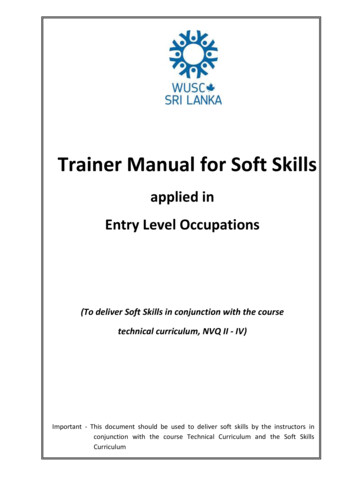


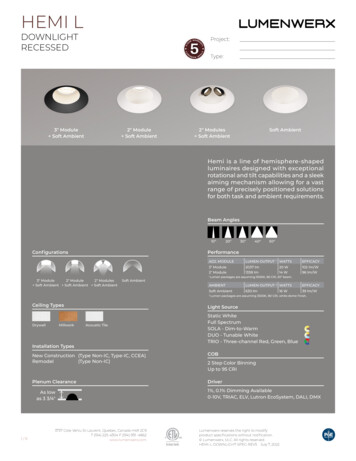
![GLOBAL MASTER IN BUSINESS ADMINISTRATION [GMBA]](/img/9/cat-p-192-i.jpg)
